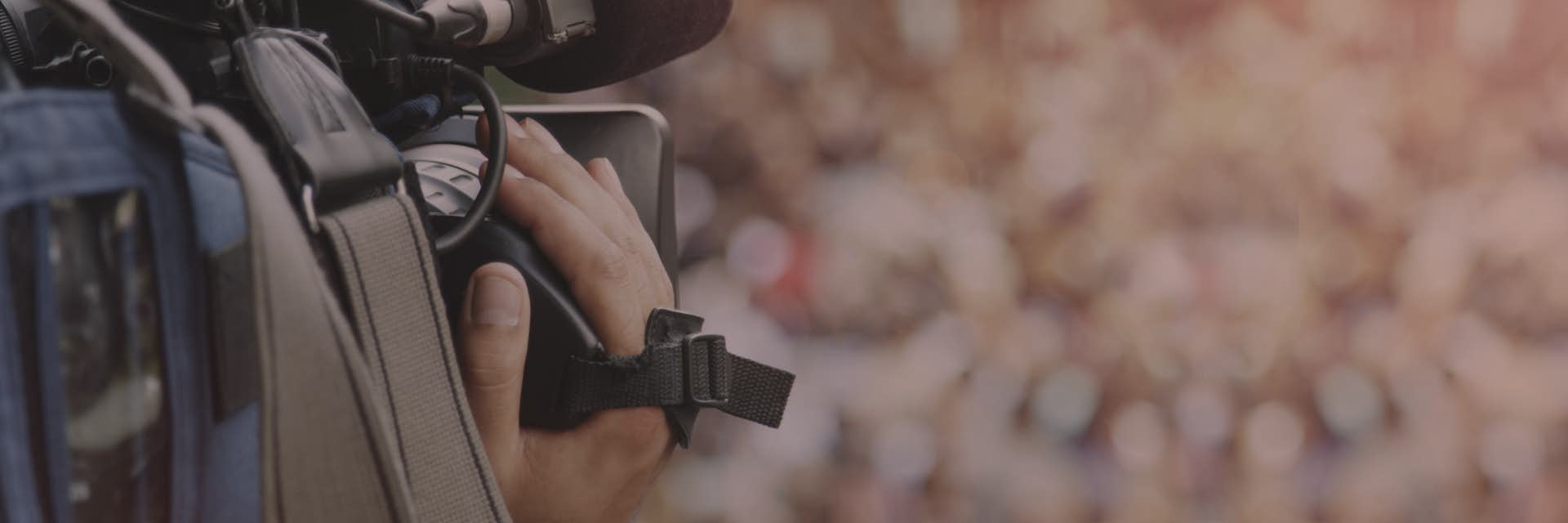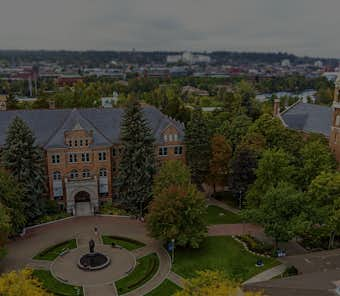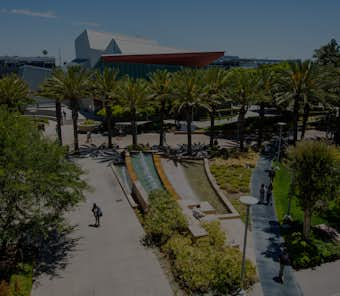
Study broadcasting abroad
Find programs that match your eligibility and aspirations then apply with reduced application fees, a free assessment and access to a dedicated advisor.
Find your perfect broadcasting programs abroad
Find broadcasting programs you love that match your needs & aspirations, where you stand a high chance of acceptance.
-

PhD programs in
broadcastingNo programs listed
Broadcasting degrees abroad
Broadcasting is the recording and transmission of news and information through various platforms including radio, television, the internet and social media. Students studying broadcasting programs will have the opportunity to learn about recording, filming, writing, producing, presenting and editing content.
Broadcasting is one of the fastest-changing professions in today’s world. Advancements in technology mean that we can now report and access news from almost every corner of the globe. By studying broadcasting abroad, you’ll see its growing global nature first-hand and will be equipped with the tools to excel in an increasingly competitive media landscape.
It’s a great idea to study broadcasting abroad not only because of the wide range of programs on offer, but also because you’ll develop both personally and professionally. To succeed in broadcasting, you’ll need to be able to immerse yourself in new environments, communities and cultures. By experiencing and exploring new places while studying, you’ll gain these vital industry skills.

Why use Studee?
-
Find your ideal program
Filter 10,000s of programs down to a shortlist perfect for you, where you have a strong chance of getting admitted
-
Apply online via Studee
Complete our application form and enjoy reduced application fees and access to unique Studee scholarships for many universities
-
We assess within 48hrs
We complete an 85-point assessment within 2 business days, help you with improvements then submit to your university
-
University offer in 2-4 weeks
We chase the university for your admission decision and keep you updated. We all celebrate your admission!
All our services are 100% free as we're funded by universities. You pay deposits and tuition fees directly to the university.

Broadcasting program structure
Broadcasting can be studied all over the world, but how it’s studied will depend on the type of program and the country you’re in.
If you’re an international student in the US, there are various ways to study broadcasting, including a one-year certificate program or a two-year associate degree. However, broadcasting is most traditionally studied as a major or minor component of a four-year BA or BSc degree. The US liberal arts model means that you would spend a certain amount of time and credits on broadcasting-specific modules.
Broadcasting can be studied as a stand-alone subject at both master’s and doctorate level in the US.
In the UK, you can study broadcasting as a single-honours or a joint-honours course. This means that you can study it by itself or alongside another subject. Master’s and doctorate programs are available in the UK.
Broadcasting programs will usually be made up of a combination of theoretical lectures and practical classes where you’ll have the chance to use industry-standard equipment. There will also be small-group workshops, personal tutorials and individual study time.
Broadcasting programs may differ in name. For example, similar programs may be called ‘multimedia’, ‘broadcast communications’, ‘media and communications’, ‘broadcast television and radio’, or similar titles. Although the structure and content of these programs will differ, they will typically include the following areas of study:
- Film and television production practices
- Editing for film, television and video
- Mass communication law
- Audio production and editing
- Presenting and writing for broadcast
- Broadcasting ethics
- Researching and newsgathering for broadcast
Types of broadcasting degrees
Best countries to study broadcasting
Broadcasting study abroad programs
Broadcasting undergraduate programs
Bachelor's in broadcasting
-
Mass Communication: Broadcast & Digital Media - BSc Campbellsville University, USA
- Program type
- Bachelor's
- Duration
- 4 years
- Annual tuition fee
-
25,600 USD
Fees are displayed in the university's local currency
- Start date
- August, January
-

Broadcast and Electronic Media - BA Gonzaga University, USA
- Program type
- Bachelor's
- Duration
- 4 years
- Annual tuition fee
-
52,540 USD
Fees are displayed in the university's local currency
- Start date
- August, January, May
-
Broadcasting - BA Louisiana State University, USA
- Program type
- Bachelor's
- Duration
- 4 years
- Annual tuition fee
-
28,700 USD
Fees are displayed in the university's local currency
- Start date
- September, January
-
Broadcasting and Mass Communication - BA State University of New York at Oswego, USA
- Program type
- Bachelor's
- Duration
- 4 years
- Annual tuition fee
-
18,679 USD
Fees are displayed in the university's local currency
- Start date
- August, January
-
Communication Arts: Digital Media: Film, Broadcasting and Journalism - BA St. Francis College, USA
- Program type
- Bachelor's
- Duration
- 4 years
- Annual tuition fee
-
27,461 USD
Fees are displayed in the university's local currency
- Start date
- September, January
Associate in broadcasting
-

Broadcast Programming and Production - AA Santa Monica College, USA
- Program type
- Associate
- Duration
- 2 years
- Annual tuition fee
-
9,264 USD
Fees are displayed in the university's local currency
- Start date
- June, August, January, February
-
Performance and Production for Video, Broadcast and Digital Cinematography - AA Laney College, USA
- Program type
- Associate
- Duration
- 2 years
- Annual tuition fee
-
10,740 USD
Fees are displayed in the university's local currency
- Start date
- August, January
Diploma in broadcasting
-

Broadcast and Online Journalism - Dip British Columbia Institute of Technology, Canada
- Program type
- Undergraduate diploma
- Duration
- 2 years
- Annual tuition fee
-
20,786 CAD
Fees are displayed in the university's local currency
- Start date
- January
Certificate in broadcasting
-

Broadcast Announcing - Cert Lake Land College, USA
- Program type
- Undergraduate certificate
- Duration
- 1 year
- Annual tuition fee
-
13,900 USD
Fees are displayed in the university's local currency
- Start date
- June, August, January
-
Performance and Production for Video, Broadcast and Digital Cinematography - Cert Laney College, USA
- Program type
- Undergraduate certificate
- Duration
- 1 year
- Annual tuition fee
-
10,740 USD
Fees are displayed in the university's local currency
- Start date
- August, January
Broadcasting graduate programs
Master's in broadcasting
-
Broadcasting and Mass Communication/Business Administration - Dual BA/MBA State University of New York at Oswego, USA
- Program type
- Bachelor's/Master's
- Duration
- 5 years
- Annual tuition fee
-
19,537 USD
Fees are displayed in the university's local currency
- Start date
- August, January, June
Future broadcasting careers
As a broadcasting graduate, you’ll be well placed to begin a career in the media industry. With the knowledge you’ll have gained about researching, presenting, editing and producing, you’ll have the right tools to excel in roles including:
- Broadcast journalist
- Studio manager
- Media researcher
- Television/film/video producer
- Camera operator
- Studio technician
- Video editor
- Videographer
Careers in media are very competitive and can come down to how much real-world broadcasting experience you’ve gathered during your studies. So, it’s a good idea to make the most of any extracurricular media activities that may be offered to you and to try and secure internships and placements during university holidays.

















